Unit 3 Could you please clean your room? 教学课件
文档属性
| 名称 | Unit 3 Could you please clean your room? 教学课件 |

|
|
| 格式 | zip | ||
| 文件大小 | 1.6MB | ||
| 资源类型 | 教案 | ||
| 版本资源 | 人教新目标(Go for it)版 | ||
| 科目 | 英语 | ||
| 更新时间 | 2016-03-22 00:00:00 | ||
图片预览

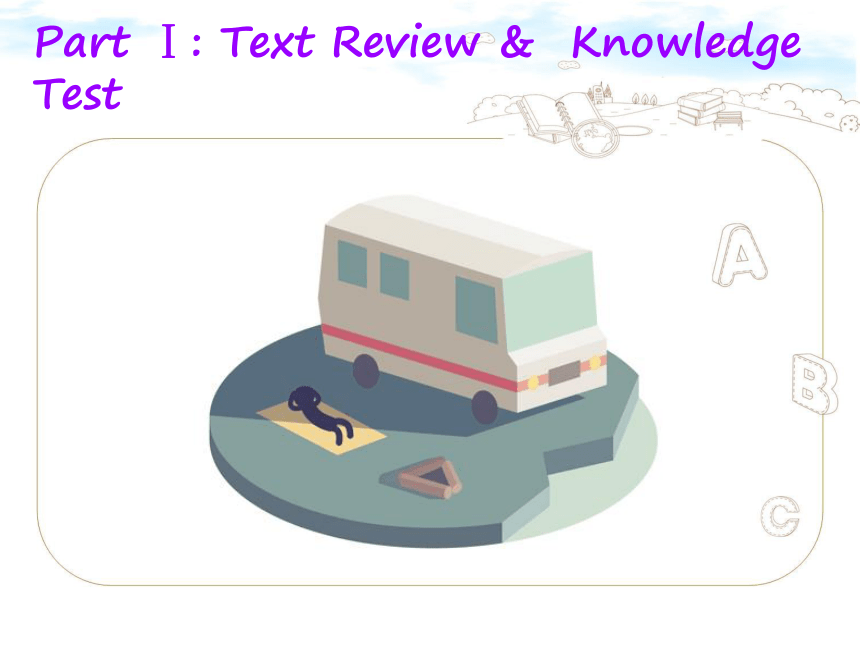
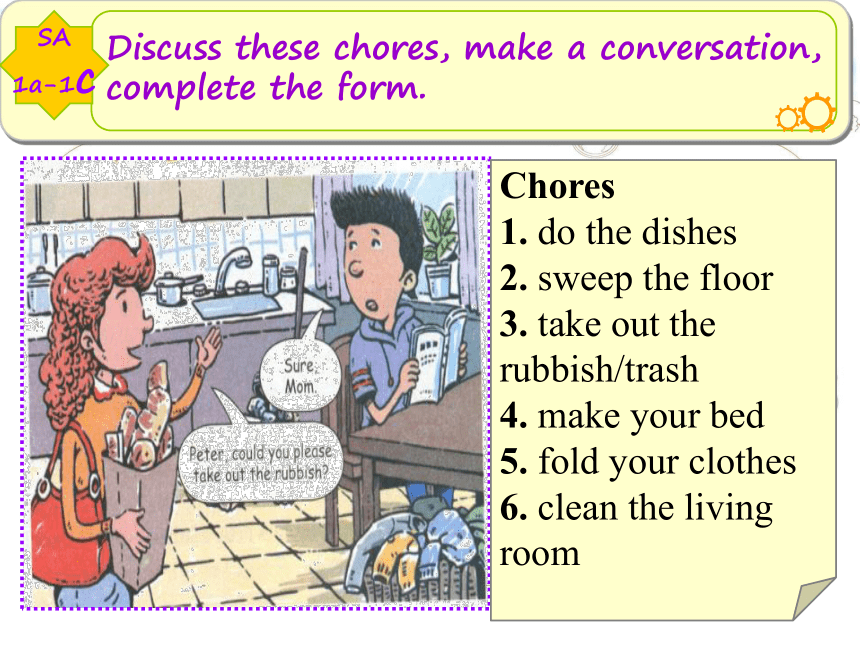
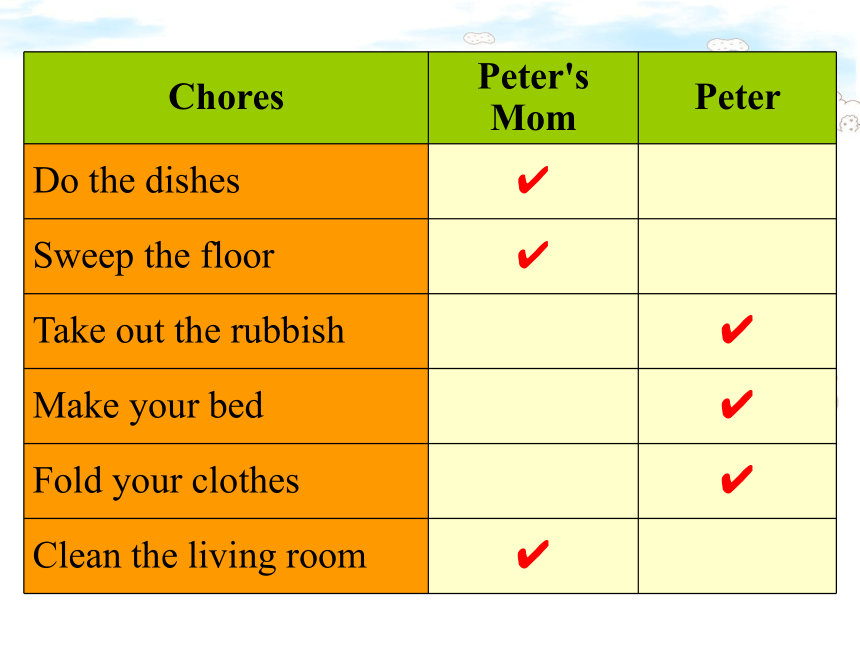
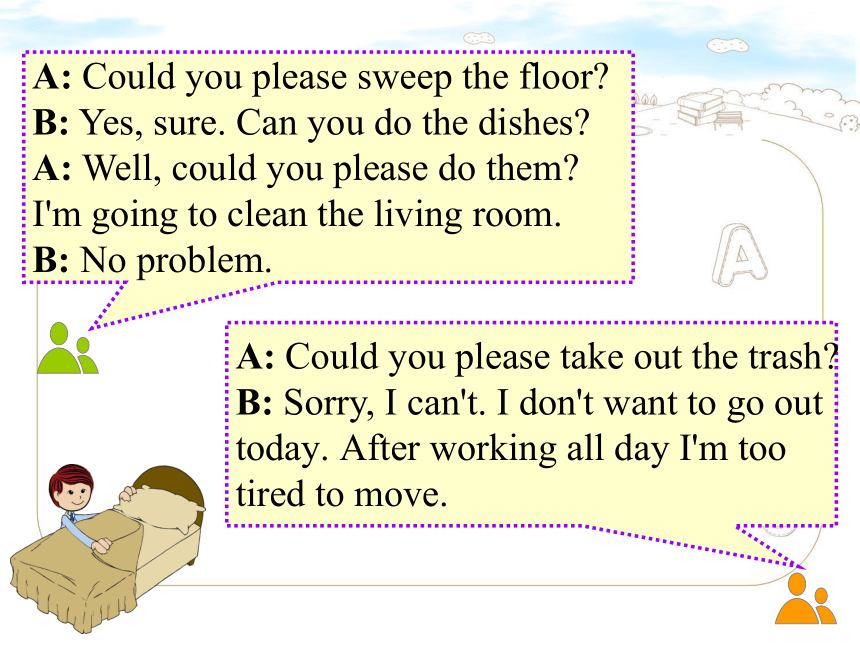
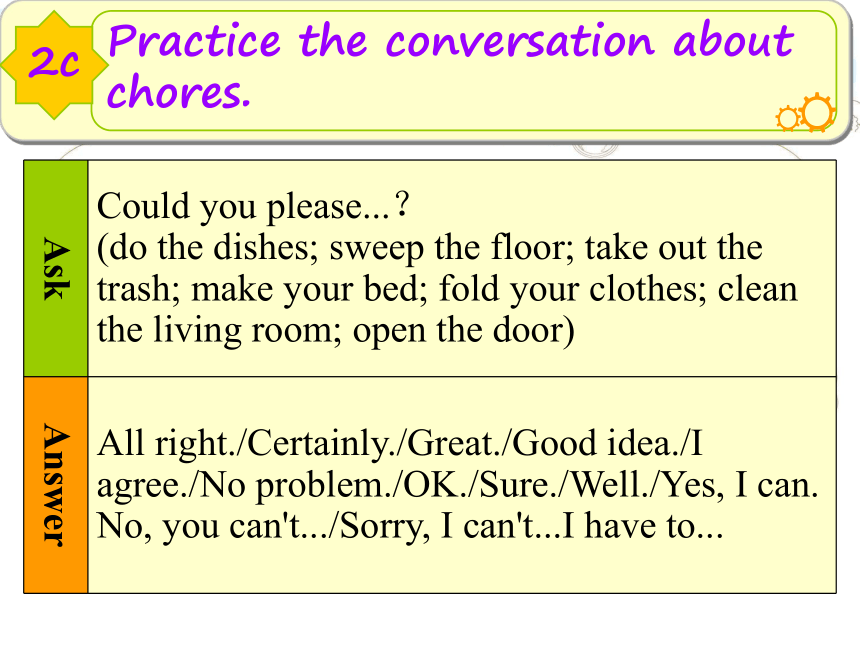
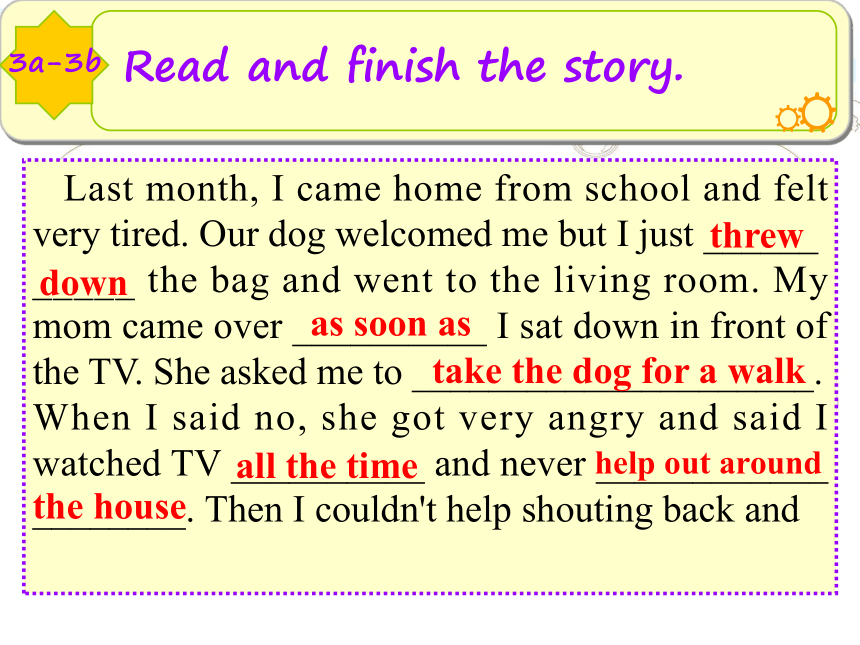
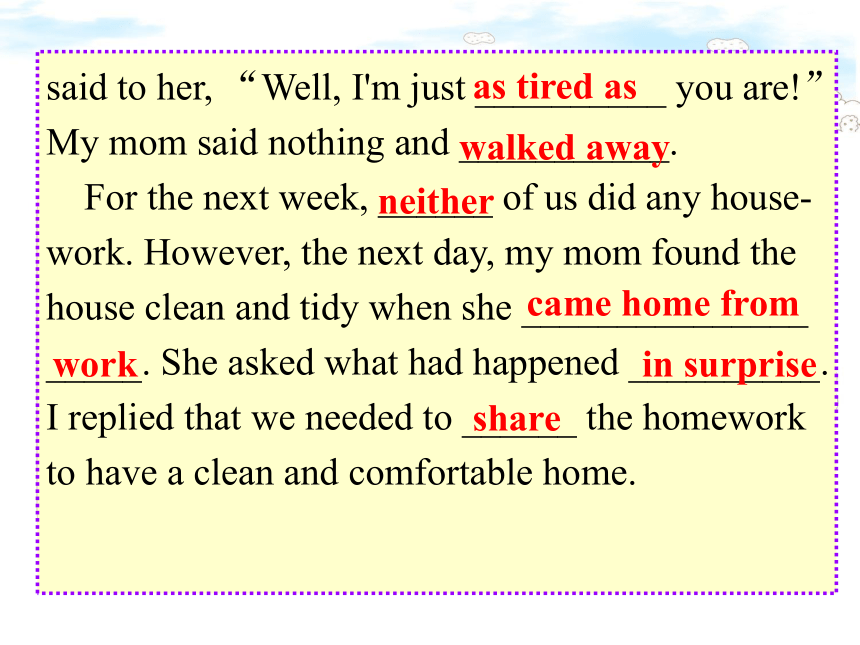
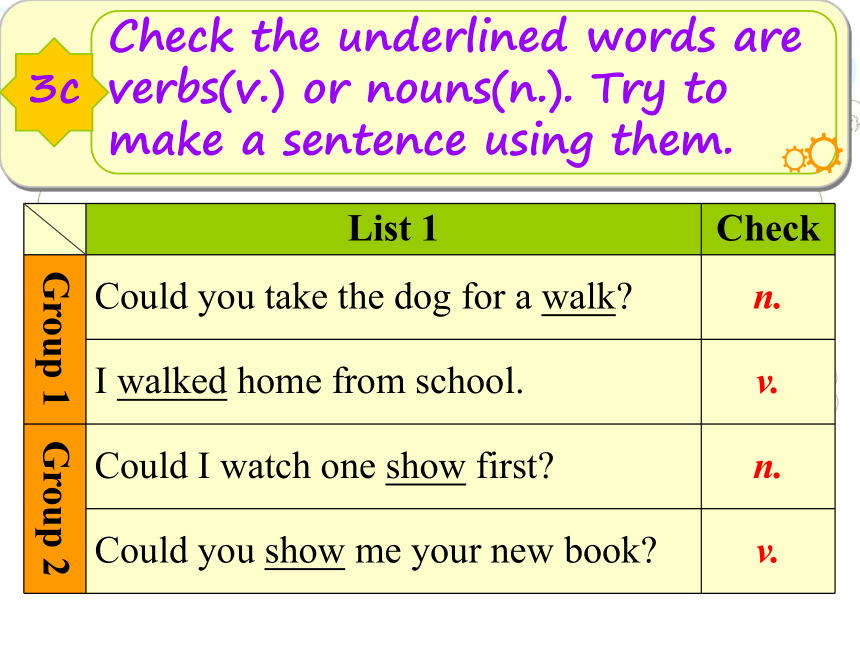
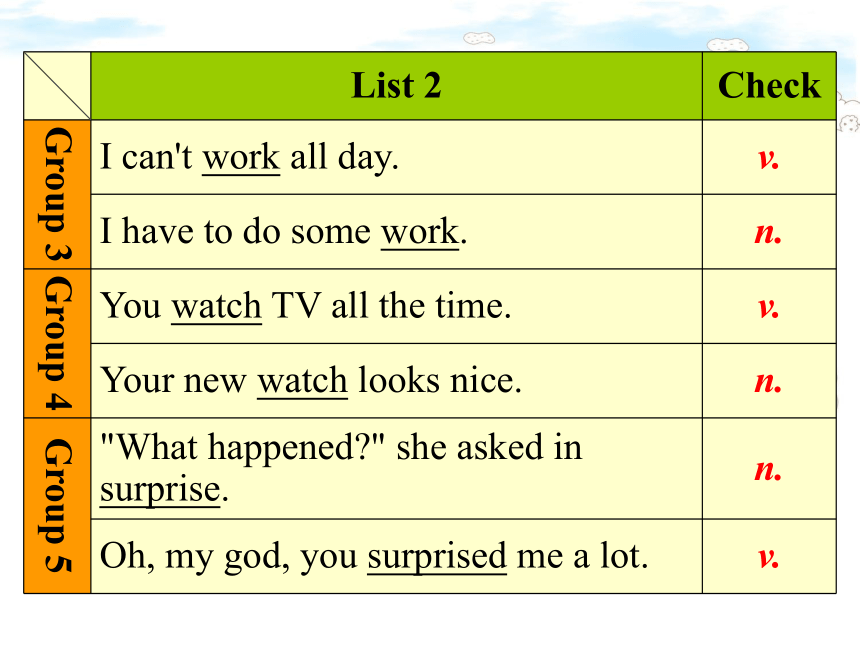
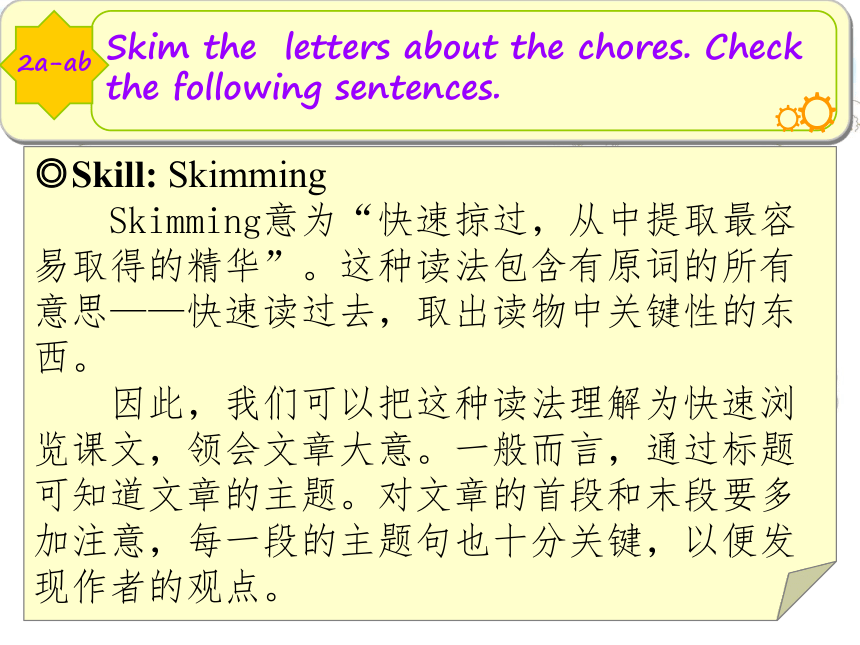
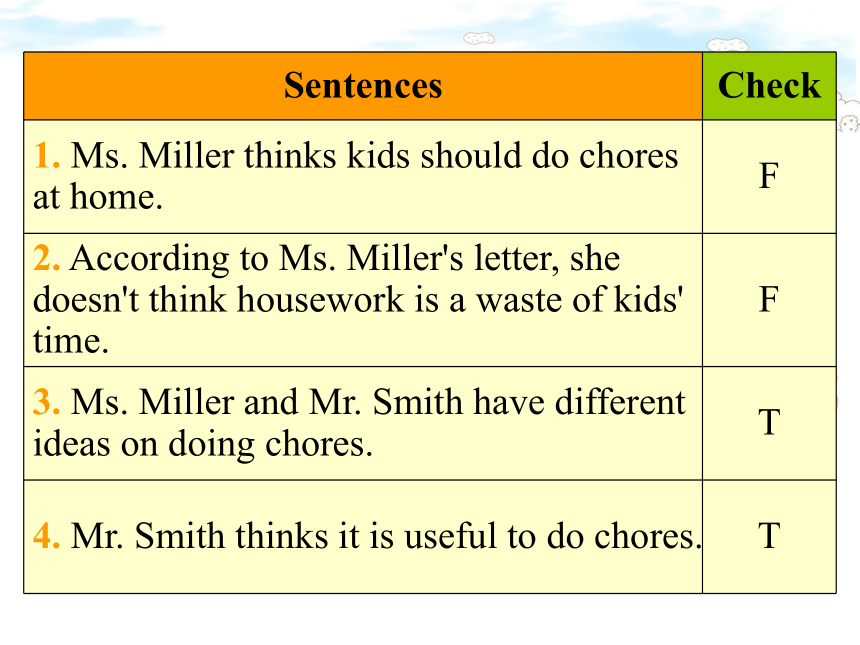
文档简介
课件79张PPT。Unit 3 Could you please
clean your room?Part Ⅰ: Text Review & Knowledge Test
Part Ⅱ: Key Words, Phrases & Sentences
Part Ⅲ: Grammar FocusPart Ⅰ: Text Review & Knowledge TestChores
1. do the dishes
2. sweep the floor
3. take out the rubbish/trash
4. make your bed
5. fold your clothes
6. clean the living roomA: Could you please sweep the floor?
B: Yes, sure. Can you do the dishes?
A: Well, could you please do them? I'm going to clean the living room.
B: No problem.A: Could you please take out the trash?
B: Sorry, I can't. I don't want to go out today. After working all day I'm too tired to move. Last month, I came home from school and felt very tired. Our dog welcomed me but I just ______
_____ the bag and went to the living room. My mom came over __________ I sat down in front of the TV. She asked me to _____________________. When I said no, she got very angry and said I watched TV __________ and never ____________ ________. Then I couldn't help shouting back and downas soon astake the dog for a walkthrewall the timethe house help out aroundsaid to her, “Well, I'm just __________ you are!” My mom said nothing and ___________.
For the next week, ______ of us did any house-work. However, the next day, my mom found the house clean and tidy when she _______________
_____. She asked what had happened __________. I replied that we needed to ______ the homework to have a clean and comfortable home.neitherworkin surpriseshareas tired aswalked awaycame home from◎Skill: Skimming
Skimming意为“快速掠过,从中提取最容易取得的精华”。这种读法包含有原词的所有意思——快速读过去,取出读物中关键性的东西。
因此,我们可以把这种读法理解为快速浏览课文,领会文章大意。一般而言,通过标题可知道文章的主题。对文章的首段和末段要多加注意,每一段的主题句也十分关键,以便发现作者的观点。Dear Sir or Madam,
I think/believe that _______________________.
I agree/disagree that ______________________.
I think it is fair/unfair for children to _________________________________________.
I think children should/should not ___________
because___________________________________.
For example, they should/should not _________ because___________________________________.
...
Yours truly,
__________PatternDear Sir or Madam,
I believe that children should do some chores at home. I disagree that children's only job is to study hard and do well at school.
However, I think it is unfair for children to expect their parents to work hard outside and do all the household chores, too. I think children should at least do some simple chores to help their busy
parents.Model For example, they should make their own beds and clean their own rooms because they are the ones who use these. They may not have time to help with the other parts of the house, but they should try to be responsible for their own area. This will help them to grow up to be independent and responsible adults.
Yours truly,
Alex BlackModelPart Ⅱ: Key Words, Phrases & Sentences1. help out (with sth.)是一个phrasal verb,表示在某人繁忙或是遇到困难时“给予帮助”。
help与out之间还可以加具体的人。
Can you help me out with the clean-up?
你能帮助我做大扫除吗?
2. any minute now是一种常见口语表达,相当于“随时;马上;在任何时候”的意思,minute 还可替换为second, moment, time等。
we are expecting them any minute/moment/second/time now.3. And anyway, I think doing chores is not so difficult.
反正我觉的干家务也不太难。
anyway adv.反正;仍然;依然。置于句首时,其后常常用逗号与其他成分隔开。anyway还可以表示“不管怎样;无论如何”。
It's just a cold. But anyway you should still see the doctor.
4. The earlier kids learn to be independent, the better it is for their future.
孩子们越早学会独立,对他们的未来就越好。
“the+比较级+..., the+比较级+...” 表示“越……,就越……”。
The more friends you have, the happier you will be.
朋友越多,你就越快乐。
The more a person reads, the wiser he will become.
一个人书读得越多就会变得越聪明。5. Peter, could you please take out the rubbish?
皮特,请你把垃圾倒掉好吗?
take out拿出;取出
take sth. out of ...把某物从……拿出来
take out是由“v.+adv.”构成的动词短语, n.作宾语时可以放在短语中间或之后; pron.作宾语时必须将其放在短语中间。
He took a dictionary out./He took out a dictionary.
他拿出来一本字典。
He took a dictionary out of his bag.
他从书包里拿出来一本字典。◎Extension
take care of照顾;照看
take down拆除;写下
take lessons上课
take off脱下;起飞
take part in参加
take walks散步◎Practice
1. 字典在我的书包里。我马上拿出来。
The dictionary is in my schoolbag. I'll ___ ___ ___.
2. 天气很热。请脱下你的外套吧。
It's very hot. Please ___ ___ your coat. take itouttake off6.work on=work at从事;忙于
He is working on/at a new novel.
他正在写一部小说。
◎Extension
work on sb./sth.奏效;产生预期的结果
The pills work on cough well.
药对治疗咳嗽很有效果。
His charm doesn't work on me.
我不为他的魅力所动。◎Practice
1. —Could I borrow your computer, Bob?
—Sorry, I am ___ it.
A. taking out B. turning on C. working onC7.borrow v. 借;借用
◎Contrast: borrow & lend借
borrow v.借;借入;借用。从主语的角度讲,指“借入、借用他人的东西供自己使用”。常与from(prep.)连用。
borrow sth. from sb./borrow one's sth.向某人借某物
lend v.借出;借给。从主语的角度讲,表示“把自己的东西借出给别人使用”。常与to(prep.)连用。
lend sb. sth./lend sth. to sb.借给某人某物
borrow和lend均为非延续性动词,若表达借某物多长时间时,不能用borrow或lend, 而要用keep,意为“保存;保留”。
◎Graphic presentation ◎Summary◎Practice
1. I ___ some books from my friend and I ___ them to my cousin this morning.
A. lent; kept B. kept; lent
C. lent; borrowed D. borrowed; lent
2. -Can I ___ your eraser?
-Sorry. Lily ___ it already.
A. lend; has lent B. borrow; has lent
C. lend; has borrowed D. borrow; has borrowed
3. —How long can she ___ the book? —Two weeks.
A. borrow B. lend C. keep D. returnDDC8. hate v.厌恶;讨厌;憎恨
反义词①like喜欢②love喜欢;酷爱◎Practice
1. 吉姆讨厌英语。
Jim ______ ______.
2. Many people don't like to write letters today.(改为同义句)
Many people ___ ___ ___ letters today.hates Englishhate to write9. invite sb. (to sth.)邀请某人
invite sb. to do sth.邀请某人做某事
He invited us to spend the holiday in the countryside.
他请我们去乡下度假。
◎Practice
1. 他们将邀请一位著名的科学家做演讲。
They'll _____ a famous scientist _____ _____ a speech.
2. 这个周末吉姆想邀请朋友们来参加他的生日聚会。
Jim wants to _____ his friends _____ his birthday party this weekend.to give/makeinviteinviteto10. I'm just as tired as you are!
as ... as“和……一样”,表示同级的比较。使用时要注意第一个as为adv.,第二个as为conj.。其基本结构为:as+adj./adv.+as。
as … as的否定形式为“not as/so+adj./adv.+as”。
This film is as interesting as that one.
这部电影和那部电影一样有趣。
He didn't act as well as you.
他表现得不如你好。11. For one week, she did not do any housework and neither did I.
neither adv.也不。放在句首,“neither+助动词(be动词/情态动词/do)+主语”是倒装结构,表示前面所述否定内容适用于另一人或物,采用部分倒装。 neither可用nor替换。 neither pron.两者都不;双方均不
—I don't like this dress.
—Neither/Nor do I.(主语置于助动词或系动词之后)
——我不喜欢这件连衣裙。
——我也不喜欢。
He answered neither of the letters.
他两封信都没回。◎Practice
1. Chris was not at home and neither _______ his sister.
2. My father can't swim and neither _______ I.
3. Tom didn't believe a word she said, and neither _______ the police.wasdidcan◎Contrast: also, either, neither, too
1. also是比较正式的用语,语气较庄重。它通常放在句中,位于行为动词之前,连系动词之后;如有助动词或情态动词,一般放在助动词或情态动词之后。
Peter also has two brothers.
皮特也有两个兄弟。
I am also a student.
我也是一名学生。
Mrs. Green can also sing the song in Chinese.
格林夫人也能用汉语唱这首歌。2. too是普通用词,多用于口语,语气较随便。一般用在肯定句中,放在句末。
I'm in Row 1, too.
我也在第一排。
◎Notice: also和too一般都用于肯定句,很少用于否定句。3. either表示“也”时,一般只用于否定句,且置于句末。
I don't know him. Tom doesn't know him, either.
我不认识他,汤姆也不认识他。
If you don't go there, he won't go there, either.
如果你不去那儿,他也不会去那儿。
◎Notice: either本身没有否定的意义,所以多与 not 连用。4. neither表示“两个都不”,它作主语时,谓语动词常用单数。
Neither of you can do it.
你们两个都不能做这件事。
◎Extension(1)both...and...“既……也……;两者都……”连接并列成分。连接并列主语时, 谓语动词用复数。
(2)either“或者……或者……(二者任选其一)”
(3)none (of)“(三者以上)都不”
(4)“so + 助动词(be动词/情态动词/do) + 主语”表示前面所述肯定内容也适用于另一主语◎Practice
1. Jonathan is a little bit upset, so _______ I.
2. His mother must go home early, so _______ he.
3. I enjoy this movie, so _______ Martin.ammustdoes◎Summary◎Practice
1. 昨天他没看足球赛, 我也没看。
He didn't watch the soccer game yesterday and _____ _____ I.
2. 玛丽和露西都不在纽约工作。
________ Mary _____ Lucy _____ in New York.
3. —How do you get to school, by bus or by subway?
—_____. I get to school in my father's car.
A.Both B. All C.Either D.NeitherneitherNeithernorworksDdid12. chore为可数名词, 指(家庭中、办公室里、农场里等处)杂务(事), 尤其指日常的普通工作,令人不愉快/疲劳的工作。
housework为不可数名词,指像做饭、洗衣服、打扫卫生之类的家务活。
◎Practice
1. 1. Cleaning the blackboard is a dirty and boring ___.
A. work B. housework C. homework D. chore
2. 我叔叔在一家农场干杂务。
My uncle __________ on a farm.
3. 我经常帮着妈妈做家务活。
I often help my mom _____________.Ddoes choresdo housework13. I'll finish my homework while you help me with the dishes.
你帮我洗餐具时我将完成我的作业。
while conj.在……期间;当……的时候。引导的从句中的动词必须是延续性动词。
While children have fun, parents can take dance lessons on the beach.
孩子们玩耍时, 家长们可以在海滩上学跳舞。◎Practice
1. 你们做作业时, 请不要闲聊。
Please don't chat _____ you're _____ your homework.
2. 昨天我在公园里散步时, 看到一只猫爬到了一棵高大的树上。
_____ I was ______ a walk in the park, I saw a cat climb up a tall tree.
3. My father was preparing for his speech ___ my mother was doing some washing last night.
A. before B. while C. after D. untilwhiledoingtakingWhileB14. They should spend their time on schoolwork in order to get good grades and get into a good university.
为了取得好成绩和进入一所好的大学, 他们应该把时间花费在学业上。
in order to目的是;为了。后接动词原形,构成短语in order to do sth.,表示目的;其否定式结构为in order not to do sth.为了不做某事
◎Summary: order用法小结
1. order n.命令;指示;顺序;订单。
Please put these shoes in order.
请把这些鞋子按顺序放好。
2. order v.命令;点(菜、饮料等);订(货);预订。后接名词作宾语。
I just want to order a glass of juice.
我只是想点一杯果汁。
◎Contrast: in order to & in order that表目的
◎Practice
1. 为了使梦想成真, 我们必须努力工作。
___ ___ ___ make our dreams come true, we must work hard.
2. 为了上学不迟到, 琳达每天早晨六点钟就起床。
___ ___ ___ ___ be late for school, Linda gets up at six every morning. In order toIn order not to15. I think it is important for children to learn how to do chores and help their parents with housework.
我认为对孩子们来说学习如何做家务和帮助父母做家务是很重要的。
当不定式(短语)、动名词(短语)或从句在某句中作主语时,常用it作形式主语置于句首, 而真正的主语放在句尾。 it作形式主语的三种常见句型结构:
a. It's+adj.+to do...
b. It's +adj.+for sb.+to do...
c. It's +adj.+of sb.+to do...
◎Contrast:
It's+adj.+for sb.+to do... & It's+adj.+of sb.+to do...◎Practice
1. 拥有健康的生活方式很重要。
_____ very important _____ _____ a healthy lifestyle.
2. 对孩子们来说学会如何照顾自己是很有必要的。
_____ necessary _____ children _____ _____ how to look after themselves.
3. 你帮助我做家务, 真是太好了。
_____ kind _____ you _____ _____ me with the housework.It'sIt'sto haveforto learnIt'softo help16. too much太多
Some students say they used to be much too tired because they had too much homework to do.
一些学生说以前他们太累, 因为他们有太多的作业要做。
◎Contrast: too much & much too & too manyPart Ⅲ: Grammar Focus modal v.1. modal v.
情态动词不能单独做谓语, 除ought和have外, 后面只能接不带to的不定式。情态动词没有非谓语形式,即没有不定式、分词等形式。
情态动词没有人称和数的变化,即情态动词第三人称单数不加-s;但有些情态动词, 如can、will有一般式和过去式的变化。 情态动词不能表示正在发生或已经发生的事情, 只表示期待或估计某事的发生。情态动词的“时态”形式并不是时间区别的主要标志, 不少情况下, 情态动词的现在式和过去式形式都可用来表示现在时间、过去时间和将来时间。◎Summary(1)can & could:could是can的过去式
①can
a. 表示体力或脑力的能力
The girl can dance very well.
b. 表示说话的推测﹑事物的可能性等
Can the news be true?
c. 在口语中, can可以表示请求或允许
Can I sit here?
—Could you +v.原+...?/Could you please+v.原+... ? (更委婉)请你做……好吗?
—Yes, sure./Sure./Of course./No problem./I'm Sorry./Sorry, I can't. 表示“能够”时can=be able to,但can只用于一般现在时或过去时,而be able to可用于各种时态;can表示个人有某种能力,而be able to表示某人通过努力、克服困难做成某事,相当于succeed in doing sth.;叙述过去事实时,最好用was/were able to,因为could只表示过去具有某种能力。
Can you understand the different kinds of English these people are using?
Two years later, he was able to speak very good Chinese.◎Practice
1. —Could you please clean the room?
—___ I have to do my homework.
A. Yes, sure. B. Why not?
C. Sorry, you can't. D. Sorry, I can't.
2. - Mum, Could I go to Beijing with you?
-Yes, ___. But you have to finish your homework first.
A. you can B. you could C. you can't D. you couldn'tDA②could
-Could I/we +v.原+...?请问我(们)能做……吗?
-Sure./Of course./No problem./I'm sorry/Sorry,
you can't.(若关系比较亲近, 也可直接说No, you can't.)a. could是can的过去式,表示与过去有关的能力和推测
We all knew that the young man couldn't be a doctor.
b. could可以代替can表示请求,但语气较can客气和委婉。can 表示一般性的请求,语气随便, 常用于熟人之间或长辈对晚辈、上级对下级的场合。could表示有礼貌的请求,语气委婉,常用于非熟人之间或晚辈对长辈、下级对上级的场合。
Could you lend me your dictionary? can和could接动词的完成形式,表示可能已经做某事。can用在否定和疑问句中, 表示不相信、怀疑等态度。
They can't have gone out because the light is still on.
以could或would提问时,不能再以could或would作答,而应该用can或will。
—Could I borrow your dictionary?
—Yes, of course you can.◎Notice
1. 提出委婉的请求在回答中不可用could。
-Could I have the television on?
-Yes, you can./No, you can't.
2. 在否定、疑问句中表示推测或怀疑用couldn't。
He couldn't be a bad man.他不大可能是坏人。
3. 在表示“请求帮助、请求允许”疑问句中,常用could代替can,表示礼貌、委婉或不确定;而can则不具备这些语气。这时不能把could看作can的过去式。表示请求帮助或请求允许时,除了can, could之外,还可以用may。(2)may & might
表示允许或请求,表示没有把握的推测;may放在句首, 表示祝愿。might表示推测时, 不表示时态,只是可能性比may小。
May God bless you!
He might be at home.
(3)have to & must
两词都是“必须”的意思, have to表示客观的需要,must 表示说话人主观上的看法, 即主观的必要。
My brother was very ill, so I had to call the doctor in the middle of the night.
我弟弟病得很厉害,我只得半夜里把医生请来。
He said that they must work hard.
他说他们必须努力工作。 have to有人称、数、时态的变化,而must只有一种形式。但must可用于间接引语中表示过去的必要或义务。
He had to look after his sister yesterday.
在否定结构中,don't have to表示“不必”,mustn't表示“禁止”。
You don't have to tell him about it.
你不一定要把此事告诉他。
You mustn’t tell him about it.
你一定不要把这件事告诉他。◎Practice
Ⅰ. Complete the sentences.
1. ——请你教我如何制作香蕉奶昔好吗?
——好的, 当然可以。
—_____ you please _____ me how to make a banana
milk shake?
—___, ____.
2. ——请你把我们的院子打扫一下好吗?
——当然可以。
—_____ you please _____ our yard?
—_________________. CouldteachYessureSure/Certainly/OKCouldsweep3. ——请你帮我洗车好吗?
——对不起, 我不能。我必须去上学。
—Could you please help me wash the car?
—_____, ___ ___. I have to go to school.
4. ——我能坐在这儿吗?
——是的, 你可以坐这儿。
—_____ I ____ here?
—Yes, you _____.
5. ——我能借一下你的电动车吗?
——对不起。我得骑车外出。
—_____ I _____ your e-bike?
—_____. I have to ride it to go out.SorryI can'tSorryCouldCouldsitcanborrowⅡ. Choose
1. —___ I go out to play now, Mum?
—No, you ___.
A. Could, couldn't B. Could, can't
C. Can, mustn't D. Can, needn't
2. They started early that morning in order that they____ there before noon.
A. might get B. may get
C. would get D. gotBC3. Bob can not come out to play because he ___ help Dad in the garden.
A. can B. can not C. has to D. must
4. You ___ wait for me yesterday.
A. haven't B. hadn't C. don't have to D. didn't have toCD◎Don't put off till tomorrow what should be done today.
◎That's all for today!
Part Ⅱ: Key Words, Phrases & Sentences
Part Ⅲ: Grammar FocusPart Ⅰ: Text Review & Knowledge TestChores
1. do the dishes
2. sweep the floor
3. take out the rubbish/trash
4. make your bed
5. fold your clothes
6. clean the living roomA: Could you please sweep the floor?
B: Yes, sure. Can you do the dishes?
A: Well, could you please do them? I'm going to clean the living room.
B: No problem.A: Could you please take out the trash?
B: Sorry, I can't. I don't want to go out today. After working all day I'm too tired to move. Last month, I came home from school and felt very tired. Our dog welcomed me but I just ______
_____ the bag and went to the living room. My mom came over __________ I sat down in front of the TV. She asked me to _____________________. When I said no, she got very angry and said I watched TV __________ and never ____________ ________. Then I couldn't help shouting back and downas soon astake the dog for a walkthrewall the timethe house help out aroundsaid to her, “Well, I'm just __________ you are!” My mom said nothing and ___________.
For the next week, ______ of us did any house-work. However, the next day, my mom found the house clean and tidy when she _______________
_____. She asked what had happened __________. I replied that we needed to ______ the homework to have a clean and comfortable home.neitherworkin surpriseshareas tired aswalked awaycame home from◎Skill: Skimming
Skimming意为“快速掠过,从中提取最容易取得的精华”。这种读法包含有原词的所有意思——快速读过去,取出读物中关键性的东西。
因此,我们可以把这种读法理解为快速浏览课文,领会文章大意。一般而言,通过标题可知道文章的主题。对文章的首段和末段要多加注意,每一段的主题句也十分关键,以便发现作者的观点。Dear Sir or Madam,
I think/believe that _______________________.
I agree/disagree that ______________________.
I think it is fair/unfair for children to _________________________________________.
I think children should/should not ___________
because___________________________________.
For example, they should/should not _________ because___________________________________.
...
Yours truly,
__________PatternDear Sir or Madam,
I believe that children should do some chores at home. I disagree that children's only job is to study hard and do well at school.
However, I think it is unfair for children to expect their parents to work hard outside and do all the household chores, too. I think children should at least do some simple chores to help their busy
parents.Model For example, they should make their own beds and clean their own rooms because they are the ones who use these. They may not have time to help with the other parts of the house, but they should try to be responsible for their own area. This will help them to grow up to be independent and responsible adults.
Yours truly,
Alex BlackModelPart Ⅱ: Key Words, Phrases & Sentences1. help out (with sth.)是一个phrasal verb,表示在某人繁忙或是遇到困难时“给予帮助”。
help与out之间还可以加具体的人。
Can you help me out with the clean-up?
你能帮助我做大扫除吗?
2. any minute now是一种常见口语表达,相当于“随时;马上;在任何时候”的意思,minute 还可替换为second, moment, time等。
we are expecting them any minute/moment/second/time now.3. And anyway, I think doing chores is not so difficult.
反正我觉的干家务也不太难。
anyway adv.反正;仍然;依然。置于句首时,其后常常用逗号与其他成分隔开。anyway还可以表示“不管怎样;无论如何”。
It's just a cold. But anyway you should still see the doctor.
4. The earlier kids learn to be independent, the better it is for their future.
孩子们越早学会独立,对他们的未来就越好。
“the+比较级+..., the+比较级+...” 表示“越……,就越……”。
The more friends you have, the happier you will be.
朋友越多,你就越快乐。
The more a person reads, the wiser he will become.
一个人书读得越多就会变得越聪明。5. Peter, could you please take out the rubbish?
皮特,请你把垃圾倒掉好吗?
take out拿出;取出
take sth. out of ...把某物从……拿出来
take out是由“v.+adv.”构成的动词短语, n.作宾语时可以放在短语中间或之后; pron.作宾语时必须将其放在短语中间。
He took a dictionary out./He took out a dictionary.
他拿出来一本字典。
He took a dictionary out of his bag.
他从书包里拿出来一本字典。◎Extension
take care of照顾;照看
take down拆除;写下
take lessons上课
take off脱下;起飞
take part in参加
take walks散步◎Practice
1. 字典在我的书包里。我马上拿出来。
The dictionary is in my schoolbag. I'll ___ ___ ___.
2. 天气很热。请脱下你的外套吧。
It's very hot. Please ___ ___ your coat. take itouttake off6.work on=work at从事;忙于
He is working on/at a new novel.
他正在写一部小说。
◎Extension
work on sb./sth.奏效;产生预期的结果
The pills work on cough well.
药对治疗咳嗽很有效果。
His charm doesn't work on me.
我不为他的魅力所动。◎Practice
1. —Could I borrow your computer, Bob?
—Sorry, I am ___ it.
A. taking out B. turning on C. working onC7.borrow v. 借;借用
◎Contrast: borrow & lend借
borrow v.借;借入;借用。从主语的角度讲,指“借入、借用他人的东西供自己使用”。常与from(prep.)连用。
borrow sth. from sb./borrow one's sth.向某人借某物
lend v.借出;借给。从主语的角度讲,表示“把自己的东西借出给别人使用”。常与to(prep.)连用。
lend sb. sth./lend sth. to sb.借给某人某物
borrow和lend均为非延续性动词,若表达借某物多长时间时,不能用borrow或lend, 而要用keep,意为“保存;保留”。
◎Graphic presentation ◎Summary◎Practice
1. I ___ some books from my friend and I ___ them to my cousin this morning.
A. lent; kept B. kept; lent
C. lent; borrowed D. borrowed; lent
2. -Can I ___ your eraser?
-Sorry. Lily ___ it already.
A. lend; has lent B. borrow; has lent
C. lend; has borrowed D. borrow; has borrowed
3. —How long can she ___ the book? —Two weeks.
A. borrow B. lend C. keep D. returnDDC8. hate v.厌恶;讨厌;憎恨
反义词①like喜欢②love喜欢;酷爱◎Practice
1. 吉姆讨厌英语。
Jim ______ ______.
2. Many people don't like to write letters today.(改为同义句)
Many people ___ ___ ___ letters today.hates Englishhate to write9. invite sb. (to sth.)邀请某人
invite sb. to do sth.邀请某人做某事
He invited us to spend the holiday in the countryside.
他请我们去乡下度假。
◎Practice
1. 他们将邀请一位著名的科学家做演讲。
They'll _____ a famous scientist _____ _____ a speech.
2. 这个周末吉姆想邀请朋友们来参加他的生日聚会。
Jim wants to _____ his friends _____ his birthday party this weekend.to give/makeinviteinviteto10. I'm just as tired as you are!
as ... as“和……一样”,表示同级的比较。使用时要注意第一个as为adv.,第二个as为conj.。其基本结构为:as+adj./adv.+as。
as … as的否定形式为“not as/so+adj./adv.+as”。
This film is as interesting as that one.
这部电影和那部电影一样有趣。
He didn't act as well as you.
他表现得不如你好。11. For one week, she did not do any housework and neither did I.
neither adv.也不。放在句首,“neither+助动词(be动词/情态动词/do)+主语”是倒装结构,表示前面所述否定内容适用于另一人或物,采用部分倒装。 neither可用nor替换。 neither pron.两者都不;双方均不
—I don't like this dress.
—Neither/Nor do I.(主语置于助动词或系动词之后)
——我不喜欢这件连衣裙。
——我也不喜欢。
He answered neither of the letters.
他两封信都没回。◎Practice
1. Chris was not at home and neither _______ his sister.
2. My father can't swim and neither _______ I.
3. Tom didn't believe a word she said, and neither _______ the police.wasdidcan◎Contrast: also, either, neither, too
1. also是比较正式的用语,语气较庄重。它通常放在句中,位于行为动词之前,连系动词之后;如有助动词或情态动词,一般放在助动词或情态动词之后。
Peter also has two brothers.
皮特也有两个兄弟。
I am also a student.
我也是一名学生。
Mrs. Green can also sing the song in Chinese.
格林夫人也能用汉语唱这首歌。2. too是普通用词,多用于口语,语气较随便。一般用在肯定句中,放在句末。
I'm in Row 1, too.
我也在第一排。
◎Notice: also和too一般都用于肯定句,很少用于否定句。3. either表示“也”时,一般只用于否定句,且置于句末。
I don't know him. Tom doesn't know him, either.
我不认识他,汤姆也不认识他。
If you don't go there, he won't go there, either.
如果你不去那儿,他也不会去那儿。
◎Notice: either本身没有否定的意义,所以多与 not 连用。4. neither表示“两个都不”,它作主语时,谓语动词常用单数。
Neither of you can do it.
你们两个都不能做这件事。
◎Extension(1)both...and...“既……也……;两者都……”连接并列成分。连接并列主语时, 谓语动词用复数。
(2)either“或者……或者……(二者任选其一)”
(3)none (of)“(三者以上)都不”
(4)“so + 助动词(be动词/情态动词/do) + 主语”表示前面所述肯定内容也适用于另一主语◎Practice
1. Jonathan is a little bit upset, so _______ I.
2. His mother must go home early, so _______ he.
3. I enjoy this movie, so _______ Martin.ammustdoes◎Summary◎Practice
1. 昨天他没看足球赛, 我也没看。
He didn't watch the soccer game yesterday and _____ _____ I.
2. 玛丽和露西都不在纽约工作。
________ Mary _____ Lucy _____ in New York.
3. —How do you get to school, by bus or by subway?
—_____. I get to school in my father's car.
A.Both B. All C.Either D.NeitherneitherNeithernorworksDdid12. chore为可数名词, 指(家庭中、办公室里、农场里等处)杂务(事), 尤其指日常的普通工作,令人不愉快/疲劳的工作。
housework为不可数名词,指像做饭、洗衣服、打扫卫生之类的家务活。
◎Practice
1. 1. Cleaning the blackboard is a dirty and boring ___.
A. work B. housework C. homework D. chore
2. 我叔叔在一家农场干杂务。
My uncle __________ on a farm.
3. 我经常帮着妈妈做家务活。
I often help my mom _____________.Ddoes choresdo housework13. I'll finish my homework while you help me with the dishes.
你帮我洗餐具时我将完成我的作业。
while conj.在……期间;当……的时候。引导的从句中的动词必须是延续性动词。
While children have fun, parents can take dance lessons on the beach.
孩子们玩耍时, 家长们可以在海滩上学跳舞。◎Practice
1. 你们做作业时, 请不要闲聊。
Please don't chat _____ you're _____ your homework.
2. 昨天我在公园里散步时, 看到一只猫爬到了一棵高大的树上。
_____ I was ______ a walk in the park, I saw a cat climb up a tall tree.
3. My father was preparing for his speech ___ my mother was doing some washing last night.
A. before B. while C. after D. untilwhiledoingtakingWhileB14. They should spend their time on schoolwork in order to get good grades and get into a good university.
为了取得好成绩和进入一所好的大学, 他们应该把时间花费在学业上。
in order to目的是;为了。后接动词原形,构成短语in order to do sth.,表示目的;其否定式结构为in order not to do sth.为了不做某事
◎Summary: order用法小结
1. order n.命令;指示;顺序;订单。
Please put these shoes in order.
请把这些鞋子按顺序放好。
2. order v.命令;点(菜、饮料等);订(货);预订。后接名词作宾语。
I just want to order a glass of juice.
我只是想点一杯果汁。
◎Contrast: in order to & in order that表目的
◎Practice
1. 为了使梦想成真, 我们必须努力工作。
___ ___ ___ make our dreams come true, we must work hard.
2. 为了上学不迟到, 琳达每天早晨六点钟就起床。
___ ___ ___ ___ be late for school, Linda gets up at six every morning. In order toIn order not to15. I think it is important for children to learn how to do chores and help their parents with housework.
我认为对孩子们来说学习如何做家务和帮助父母做家务是很重要的。
当不定式(短语)、动名词(短语)或从句在某句中作主语时,常用it作形式主语置于句首, 而真正的主语放在句尾。 it作形式主语的三种常见句型结构:
a. It's+adj.+to do...
b. It's +adj.+for sb.+to do...
c. It's +adj.+of sb.+to do...
◎Contrast:
It's+adj.+for sb.+to do... & It's+adj.+of sb.+to do...◎Practice
1. 拥有健康的生活方式很重要。
_____ very important _____ _____ a healthy lifestyle.
2. 对孩子们来说学会如何照顾自己是很有必要的。
_____ necessary _____ children _____ _____ how to look after themselves.
3. 你帮助我做家务, 真是太好了。
_____ kind _____ you _____ _____ me with the housework.It'sIt'sto haveforto learnIt'softo help16. too much太多
Some students say they used to be much too tired because they had too much homework to do.
一些学生说以前他们太累, 因为他们有太多的作业要做。
◎Contrast: too much & much too & too manyPart Ⅲ: Grammar Focus modal v.1. modal v.
情态动词不能单独做谓语, 除ought和have外, 后面只能接不带to的不定式。情态动词没有非谓语形式,即没有不定式、分词等形式。
情态动词没有人称和数的变化,即情态动词第三人称单数不加-s;但有些情态动词, 如can、will有一般式和过去式的变化。 情态动词不能表示正在发生或已经发生的事情, 只表示期待或估计某事的发生。情态动词的“时态”形式并不是时间区别的主要标志, 不少情况下, 情态动词的现在式和过去式形式都可用来表示现在时间、过去时间和将来时间。◎Summary(1)can & could:could是can的过去式
①can
a. 表示体力或脑力的能力
The girl can dance very well.
b. 表示说话的推测﹑事物的可能性等
Can the news be true?
c. 在口语中, can可以表示请求或允许
Can I sit here?
—Could you +v.原+...?/Could you please+v.原+... ? (更委婉)请你做……好吗?
—Yes, sure./Sure./Of course./No problem./I'm Sorry./Sorry, I can't. 表示“能够”时can=be able to,但can只用于一般现在时或过去时,而be able to可用于各种时态;can表示个人有某种能力,而be able to表示某人通过努力、克服困难做成某事,相当于succeed in doing sth.;叙述过去事实时,最好用was/were able to,因为could只表示过去具有某种能力。
Can you understand the different kinds of English these people are using?
Two years later, he was able to speak very good Chinese.◎Practice
1. —Could you please clean the room?
—___ I have to do my homework.
A. Yes, sure. B. Why not?
C. Sorry, you can't. D. Sorry, I can't.
2. - Mum, Could I go to Beijing with you?
-Yes, ___. But you have to finish your homework first.
A. you can B. you could C. you can't D. you couldn'tDA②could
-Could I/we +v.原+...?请问我(们)能做……吗?
-Sure./Of course./No problem./I'm sorry/Sorry,
you can't.(若关系比较亲近, 也可直接说No, you can't.)a. could是can的过去式,表示与过去有关的能力和推测
We all knew that the young man couldn't be a doctor.
b. could可以代替can表示请求,但语气较can客气和委婉。can 表示一般性的请求,语气随便, 常用于熟人之间或长辈对晚辈、上级对下级的场合。could表示有礼貌的请求,语气委婉,常用于非熟人之间或晚辈对长辈、下级对上级的场合。
Could you lend me your dictionary? can和could接动词的完成形式,表示可能已经做某事。can用在否定和疑问句中, 表示不相信、怀疑等态度。
They can't have gone out because the light is still on.
以could或would提问时,不能再以could或would作答,而应该用can或will。
—Could I borrow your dictionary?
—Yes, of course you can.◎Notice
1. 提出委婉的请求在回答中不可用could。
-Could I have the television on?
-Yes, you can./No, you can't.
2. 在否定、疑问句中表示推测或怀疑用couldn't。
He couldn't be a bad man.他不大可能是坏人。
3. 在表示“请求帮助、请求允许”疑问句中,常用could代替can,表示礼貌、委婉或不确定;而can则不具备这些语气。这时不能把could看作can的过去式。表示请求帮助或请求允许时,除了can, could之外,还可以用may。(2)may & might
表示允许或请求,表示没有把握的推测;may放在句首, 表示祝愿。might表示推测时, 不表示时态,只是可能性比may小。
May God bless you!
He might be at home.
(3)have to & must
两词都是“必须”的意思, have to表示客观的需要,must 表示说话人主观上的看法, 即主观的必要。
My brother was very ill, so I had to call the doctor in the middle of the night.
我弟弟病得很厉害,我只得半夜里把医生请来。
He said that they must work hard.
他说他们必须努力工作。 have to有人称、数、时态的变化,而must只有一种形式。但must可用于间接引语中表示过去的必要或义务。
He had to look after his sister yesterday.
在否定结构中,don't have to表示“不必”,mustn't表示“禁止”。
You don't have to tell him about it.
你不一定要把此事告诉他。
You mustn’t tell him about it.
你一定不要把这件事告诉他。◎Practice
Ⅰ. Complete the sentences.
1. ——请你教我如何制作香蕉奶昔好吗?
——好的, 当然可以。
—_____ you please _____ me how to make a banana
milk shake?
—___, ____.
2. ——请你把我们的院子打扫一下好吗?
——当然可以。
—_____ you please _____ our yard?
—_________________. CouldteachYessureSure/Certainly/OKCouldsweep3. ——请你帮我洗车好吗?
——对不起, 我不能。我必须去上学。
—Could you please help me wash the car?
—_____, ___ ___. I have to go to school.
4. ——我能坐在这儿吗?
——是的, 你可以坐这儿。
—_____ I ____ here?
—Yes, you _____.
5. ——我能借一下你的电动车吗?
——对不起。我得骑车外出。
—_____ I _____ your e-bike?
—_____. I have to ride it to go out.SorryI can'tSorryCouldCouldsitcanborrowⅡ. Choose
1. —___ I go out to play now, Mum?
—No, you ___.
A. Could, couldn't B. Could, can't
C. Can, mustn't D. Can, needn't
2. They started early that morning in order that they____ there before noon.
A. might get B. may get
C. would get D. gotBC3. Bob can not come out to play because he ___ help Dad in the garden.
A. can B. can not C. has to D. must
4. You ___ wait for me yesterday.
A. haven't B. hadn't C. don't have to D. didn't have toCD◎Don't put off till tomorrow what should be done today.
◎That's all for today!
同课章节目录
- Unit 1 What's the matter?
- Section A
- Section B
- Unit 2 I'll help to clean up the city parks.
- Section A
- Section B
- Unit 3 Could you please clean your room?
- Section A
- Section B
- Unit 4 Why don't you talk to your parents?
- Section A
- Section B
- Unit 5 What were you doing when the rainstorm came
- Section A
- Section B
- Review of Units 1-5
- Unit 6 An old man tried to move the mountains.
- Section A
- Section B
- Unit 7 What's the highest mountain in the world?
- Section A
- Section B
- Unit 8 Have you read Treasure Island yet?
- Section A
- Section B
- Unit 9 Have you ever been to a museum?
- Section A
- Section B
- Unit 10 I've had this bike for three years.
- Section A
- Section B
